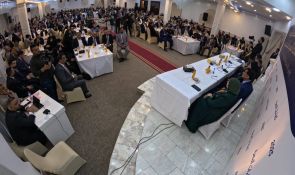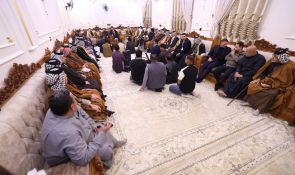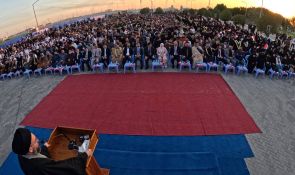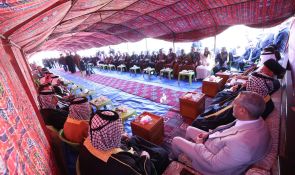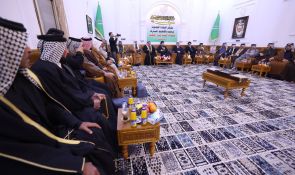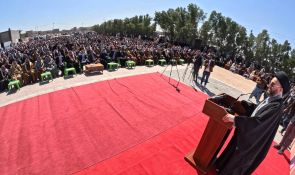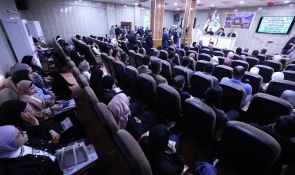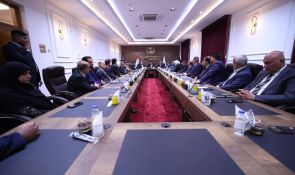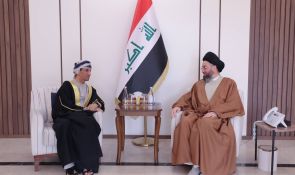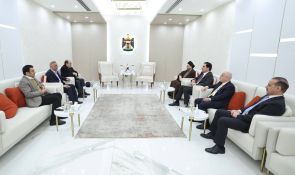SAYYID AMMAR AL-HAKIM: “A narrow outlook does not help the leadership mission succeed. Responsibility requires clemency and an open heart.”
Our talk in the past weeks was about the Islamic theory in command and administration. We stated that the covenant of the Commander of the Faithful (Ú) to Malik al-Ashtar, when he appointed him ruler of Egypt, represents a summary of this theory. We reached the eighth section of this covenant and important historic document in which the Commander of the Faithful (Ú) talks about the advisors. He addresses Malik al-Ashtar thus: “If you want to succeed in your responsibility and endeavors, you must discern your choice of advisors: Do they and the train that surrounds you have the right qualities? Do they encourage you to be close to the people or do they isolate you from them? Do they facilitate the task of your communication with the public? Do they bring people closer to your heart or do they instigate you against the citizens? You must carefully look into the advisors.
Whoever instigates the official against others must be the furthermost of all people from the official…
Ali (Ú) says, “Le the one from among your subjects who is the most distant from and the most despised by you be the one who seeks people’s faults the most.” O Malik! Let any advisor or anyone close to you who writes reports about the people and instigate you against the public be the furthermost from you. Do not get close to them because one who wishes to isolate an official from the public so he would be close to him will let you win an opportunist advisor while losing the people and a broad area of the people about whom you are responsible. “People have faults which the ruler is the most fit to cover.” The ruler, the official, has to contain these faults and keep the eyes away from them so the picture may be bright. “If you speak up your minds to each other, you will not bury each other.” If anyone is knowledgeable of the other person’s intentions, everyone will survive without anyone burying the other when the latter dies. Allah Almighty does not accept such matters. The ruler is the most worthy of cover them. The official has to cover these defects, problems and mistakes. “Do not uncover that of which you have no knowledge.” Do not uncover what is not visible. Do not install surveillance cameras and do not pursue people inside their homes or private areas. Allah Almighty does not accept it. “What you have to do is to purify what appears to you.”
The mistake that is revealed to the people…, the official has to purge it and monitor it as much as it deserves.
As regarding the mistakes that surfaces, the transgression that prevails and the scandal that becomes public, the official must purge and contain it because leaving it and neglecting it can cause the people to be immune, and abomination becomes rampant among the people. If something surfaces, the official must purge it and monitor it according to its extent. But if the thing is covered, the official must not look for it. “Allah is the One Who judges what is beyond your knowledge; so, cover the fault as much as you can so Allah may cover whatever you like your subjects not become familiar with [of your own faults].” Cover the faults of people, Allah will cover yours.
Spotlights…
FIRST: Rejection of detecting people’s faults and shortcomings… Do not look for people’s faults. An official in any position is not obligated to look for people’s faults.
SECOND: The necessity for covering faults if the official becomes personally familiar with them. You are an official, so reports and slanders will reach you, and you, official, have to cover these defects and mistakes, for Allah loves those who thus cover.
THIRD: Need to mend mistakes and defects… If defects appear and uncover to people and to the public opinion, the official must purge them in order to protect the society from abomination, transgression and erroneous behavior. The most serious matter is when there is immunity in the society.
It is wrong to violate traditions, customs and sanctities under any label or the pretext of freedom. The society that loses the restrictions, the barriers, the immunities and the brakes will be weak and exposed, and it will head towards the abyss. Nowadays, there are societies in major industrial countries whose economies are the top in the world, but you see in them family disintegration, very high rates of crime, divorce, immorality, alcoholism, drugs, etc. Yet you find in them very low indications of compassion and humanitarianism. The husband in these societies is nothing more than a plus. There are only friendships. This is what we find in foreign television series, as if it is quite normal. Few days ago, I read in a newspaper how a young man married the daughter of his brother in an Islamic country, a civil marriage registered in an official way. How does this happen?! The society that loses the immunities goes to the pitfall; therefore, if something wrong becomes rampant, and if it surfaces to the open, the official must deal with it. He must undertake a position towards it so there will be prohibition of transgression and it will not spread in the society. It is not the task of the official to spy on people. Rather, he is not permitted to do so. Sometimes an official hides under the garbs of holiness, we seek refuge with Allah from it. Allah Almighty is the One Who knows everything. He knows the intentions, what is hidden, what is secret. It is not right if the official places himself in a position so he would get to know everything about others. This is not right.
Ali (Ú) says in Sermon 86 of Nahjul-Balagha as he describes the attributes of Allah Almighty: “He knows the innermost and tested the consciences. He encompasses everything. He overcomes everything, He is strong and can do anything.” Such is Allah Almighty. He knows and He can do anything. The official must not place himself in the position of the Lord of the Worlds.
FOURTH: Natural outcomes of uncovering people’s shortcomings, mistakes and stumbles… Allah will test you likewise…
This is a natural outcome. Whenever one is more capable in his potentials, might and opportunity, his ability to transgress becomes greater. The simple individual is afraid, whereas even when he makes a mistake, the official is not criticized or charged due to fear of him. For this reason, the official’s courage to commit a transgression is greater, and so is the probability of the official falling into error, transgression and scandal more so than others. When you open others’ dossiers, the tables may turn and your own dossiers are opened and so are your secrets. It is then that the scandal will be greater than the mistakes of ordinary people because an official’s scandal is recorded in history and enters in Wikileak’s scandals even after tens and hundreds of years pass by. The official must protect others’ secrets if he wants his secrets to be protected. One who digs up a well for his brother will himself fall into it. “So cover the defect as much as you can so Allah may cover yours from your subjects.” Allah covers the defects of one who covers people’s defects, O official!
For this reason, this is the status with the natural effects of revealing secrets and shortcomings of others. It must be noted by anyone who aspires to assume a position of responsibility. Nobody is without mistakes.
Ali (Ú) says the following on p. 292, Vol. 6 of Ghurar Al-Hikam: “Do not detect people’s defects, for you have faults which, if you follow reason, must keep you away from detecting anyone’s defect.” If you have the ability to employ your mind and to think, you will get to know that keeping busy with your own defects will distract you from looking at people’s defects. From here, you have to keep busy dealing with your defects and mistakes, conducting a self-examination and holding yourself to account instead of looking for other’s slips and mistakes.
In another narrative about Ali (Ú), he is quoted as saying, “One who sees his defect will not accuse anyone else of having defects.” The Messenger of Allah (Õ) has said, “Congratulations to one whose defect keeps him busy from detecting people’s defects.” Congratulations to one who keeps himself busy dealing with his defects and shortcomings rather than detecting people’s shortcomings.
FIFTH: Forbearance… The official must have forbearance, the ability to be tolerant and clement, which is a necessary and important matter. If the official wants to succeed, he cannot be spiteful or vindictive. Responsibility and trustworthiness impose on the official to open a new page with the people. They keep away from him the opportunists and backbiters. He has to encourage the spirit of love in the area under his charge, to mitigate people and calm their souls down. The narrow outlook does not help a leading mission succeed. One who is in the position of challenge must have a broad outlook, a big heart, an open mind and not live in grudge and hatred. When Allah Almighty wanted to praise His Glorious Messenger (Õ), he said, “In the name of Allah, Most Gracious, the Most Merciful. Have We not expanded your chest for you?” (Qur’an, 94:1). This is a compliment from Allah Almighty to the greatest human being: His chest (outlook) is broad and so is his vision. Some people used to abuse the Messenger of Allah (Õ), harm and taunt him, not stopping at doing anything while he, the Messenger of the Lord of the Worlds, could have raised his hands so torment may descend on his people, for his supplication is always answered. But the most revered Prophet (Õ) used to supplicate saying, “Lord! Forgive my people, for they know not.” He prays Allah Almighty to forgive his people. Such are the characteristics of leadership: One has to be big. The Commander of the Faithful (Ú) was asked once about the Messenger of Allah (Õ), so he said, “His chest was the broadest of all people.” One who has the greatest responsibility is the one whose chest is the broadest. Imam al-Hussain (Ú) quotes his father the Commander of the Faithful (Ú) describing the Messenger of Allah (Õ) saying, “The Messenger of Allah (Õ) did not take part with others on three occasions: He never spoke ill of anyone, nor did he point out anyone’s fault, nor did he look for anyone’s slip or defect.” The messenger of Allah (Õ) did not even permit these things so affection, love and brotherhood may remain the filled half of the glass, and this is a deep lesson in life. You must see the filled part because it contains life. We must be positive in life and look at the positive things in it and build on them rather than look at negativities. This makes us cemented. It empowers the society. These are lessons of life and of the challenge from Ali (Ú) as he transmitted the sound reading of the message of Islam and of our revered Prophet (Õ).


